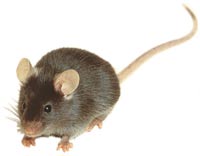Of mice and pain:
study of a higher order
by
RICK WEISS
It hurts to be smart. That's one conclusion from the latest study of so-called Doogie mice - "smart" rodents that are genetically engineered to have enhanced memory and learning skills.
Along with those extra IQ points, researchers have found, comes an added sensitivity to pain.
The new work offers a sobering lesson about the difficulty of enhancing certain brain functions without simultaneously taking a toll on others. It might temper any momentum to engineering genetic enhancements into people. Doogie mice, named after the main character in the television show Doogie Howser, MD, made a big splash when they were introduced to the world in September 1999.
Having been endowed with extra copies of a gene involved in memory formation, the animals outperformed their normal counterparts on a variety of tasks.
They were better at recognising objects they had seen before, remembered painful experiences longer and recalled with greater accuracy the location of submerged platforms in milky water.
Some scientists sniffed at the suggestion that the mice were brainy, noting intelligence was much more than a collection of four or five mental skills.
Nonetheless, the work was the first to show that, by adding a few extra copies of a single gene to an embryo, researchers improved an animal's performance on a range of memory and learning tasks.
Some suggested drugs designed to mimic the gene's effects might help Alzheimer's patients. The new work hints it won't be that easy.
Min Zhou and his colleagues at Washington University School of Medicine in St Louis assessed how Doogie mice responded to tissue damage and inflammation.
They suspected that pain caused by those types of injury might be controlled by the same "NR2B receptor" Doogie mice are overendowed with and that gives them their superior memories.
NR2B receptors are proteins that act as "coincidence detectors" in the brain. They recognise, for example, when a certain sound is linked to the arrival of food and help consolidate such coincidences into learnt associations.
The researchers subjected the mice to stimuli that caused either short-term or long-term pain.
They heated the animals' tails, poked their foot pads with stiff fibres and injected their paws with irritating solutions. Then they used neurological tests to see how the animals' brains responded and tracked their behavior.
Those tests indicated that, compared with normal mice, Doogie mice were equally sensitive to short-term pain. But chronic inflammatory pain, such as that caused by the injected irritants, lasted longer in Doogie mice.
"Our results suggest that a genetic manipulation conferring enhanced cognitive abilities may also provide unintended traits, such as increased susceptibility to persistent pain," the team reports in yesterday's issue of the journal Nature Neuroscience.
Joe Tsien, the Princeton scientist who led the creation of Doogie mice, said he wasn't convinced the mice felt more pain.
But several scientists said the new study offered strong substantiation that a Doogie mouse's pain was real.
"This is very convincing evidence" that the mice had prolonged chronic pain responses, said James L. McGaugh, a neuroscientist at the University of California at Irvine.
"Most of our brain regions are multipurpose. These things are all intertwined," he said.

